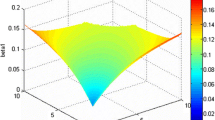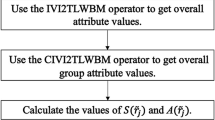Abstract
In this paper, we develop a 2-tuple prioritized weighted harmonic (2TPWH) operator and discuss its desirable properties such as idemtopency, boundedness and monotonicity. Then, we apply the 2TPWH operator to propose an approach to multiple attribute group decision making, with 2-tuple linguistic information, in which the decision makers and attributes are in different priority levels. Finally, an example is used to illustrate the applicability of the proposed approach.
Access this chapter
Tax calculation will be finalised at checkout
Purchases are for personal use only
Similar content being viewed by others
References
Zadeh, L.A.: The concept of a linguistic variable and its application to approximate reasoning. Part 1, 2, and 3, Inf. Sci. 8 199–249, 301–357 (1975). 9, 43–80 (1976)
Zadeh, L.A.: A computational approach to fuzzy quantifiers in natural languages. Comput. Math. Appl. 9, 149–184 (1983)
Xu, Z.S.: Linguistic aggregation operators: an overview. In: Bustince, H., Herrera, F., Montero, J. (eds.) Fuzzy Sets and Their Extensions: Representation, Aggregation and Models. Studies in Fuzziness and Soft Computing, vol. 220, pp. 163–181. Springer, Heidelberg (2008). doi:10.1007/978-3-540-73723-0_9
Herrera, F., Herrera-Viedma, E.: Linguistic decision analysis: steps for solving decision problems under linguistic information. Fuzzy Sets Syst. 115, 67–82 (2000)
Herrera, F., Herrera-Viedma, E., Verdegay, J.L.: A sequential selection process in group decision making with a linguistic assessment approach. Inf. Sci. 85, 223–239 (1995)
Herrera, F., Herrera-Viedma, E., Verdegay, J.L.: Linguistic measures based on fuzzy coincidence for reaching consensus in group decision making. Int. J. Approx. Reason. 16, 309–334 (1997)
Delgado, M., Herrera, F., Herrera-Viedma, E., Martínez, L.: Combining numerical and linguistic information in group decision making. Inf. Sci. 107, 177–194 (1988)
Herrera, F., Herrera-Viedma, E.: Aggregation operators for linguistic weighted information. IEEE Trans. Syst. Man Cybern. Part A: Syst. Hum. 27, 646–656 (1997)
Delgado, M., Verdegay, J.L., Vila, M.A.: On aggregation operators of linguistic labels. Int. J. Intell. Syst. 8, 351–370 (1993)
Peláez, J.I., Doňa, J.M.: LAMA: a linguistic aggregation of majority additive operator. Int. J. Intell. Syst. 18, 809–820 (2003)
Xu, Z.S.: On generalized induced linguistic aggregation operators. Int. J. Gen. Syst. 35, 17–28 (2006)
Xu, Z.S.: A method based on linguistic aggregation operators for group decision making with linguistic preference relations. Inf. Sci. 166, 19–30 (2004)
Herrera, F., Martínez, L.: A 2-tuple fuzzy linguistic representation model for computing with words. IEEE Trans. Fuzzy Syst. 8, 746–752 (2000)
Herrera, F., Martínez, L.: A model based on linguistic 2-tuples for dealing with multigranular hierarchical linguistic contexts in multi-expert decision-making. IEEE Trans. Syst. Man Cybern. Part B Cybern. 31, 227–234 (2001)
Xu, Y.L., Huang, L.: An approach to group decision making problems based on 2-tuple linguistic aggregation operators. In: ISECS International Colloquium on Computing, Communication, Control, and Management, pp. 73–77. IEEE Computer Society, Guangzhou (2008)
Zhang, Z.: 2-tuple prioritized aggregation operators and their application to multiple attribute group decision making. British J. Math. Comput. Sci. 4, 2278–2297 (2014)
Yager, R.R.: Prioritized aggregation operators. Int. J. Approx. Reason. 48, 263–274 (2008)
Author information
Authors and Affiliations
Corresponding author
Editor information
Editors and Affiliations
Rights and permissions
Copyright information
© 2017 Springer International Publishing AG
About this paper
Cite this paper
Park, J.H., Lee, S.B., Koo, J.H., Kwun, Y.C. (2017). 2-Tuple Prioritized Weighted Harmonic Operator and Its Use in Group Decision Making. In: Liu, D., **e, S., Li, Y., Zhao, D., El-Alfy, ES. (eds) Neural Information Processing. ICONIP 2017. Lecture Notes in Computer Science(), vol 10636. Springer, Cham. https://doi.org/10.1007/978-3-319-70090-8_93
Download citation
DOI: https://doi.org/10.1007/978-3-319-70090-8_93
Published:
Publisher Name: Springer, Cham
Print ISBN: 978-3-319-70089-2
Online ISBN: 978-3-319-70090-8
eBook Packages: Computer ScienceComputer Science (R0)




